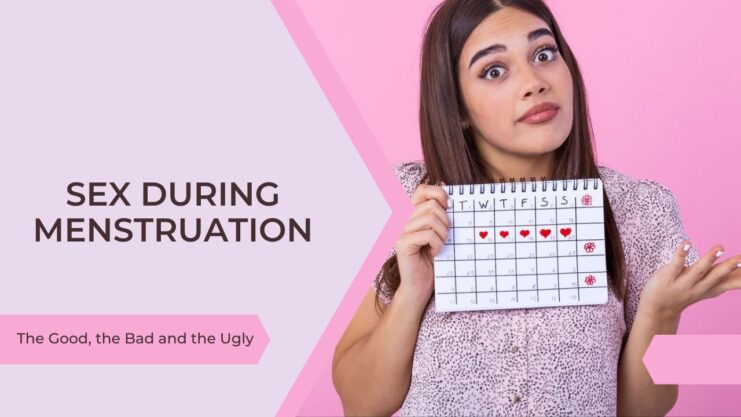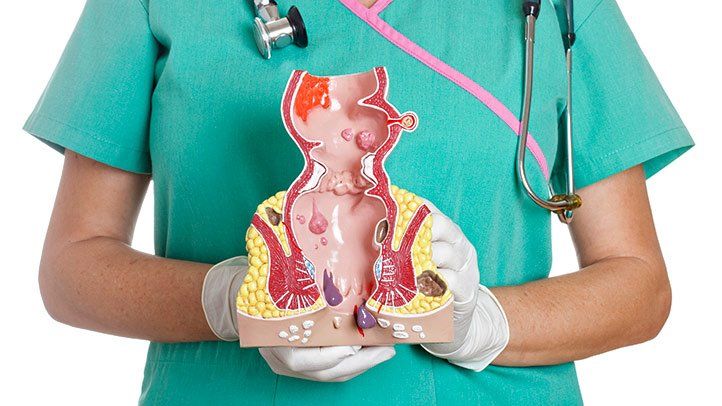In the realm of human experiences, there are certain topics that can evoke a sense of intrigue, controversy, and even discomfort. One such subject is the intersection of sex and menstruation—a fascinating, yet often shrouded, facet of human sexuality. In this article, we embark on a journey to uncover the enigmatic world of sex during menstruation, exploring the good, the bad, and the ugly aspects that lie within.
In a world where taboos and societal norms intertwine with personal beliefs and preferences, the topic of sex during menstruation remains veiled in a mystifying haze. It is a realm where curiosity dances with apprehension, and where passion mingles with hesitation. But fear not, for we are here to unravel the truth and shed light on the complexities that surround this intimate union.
First, let us explore the good—the tantalizing allure that draws some individuals towards embracing their sexuality during this time of the month. We will venture into the realm of hormonal fluctuations, where the ebb and flow of estrogen and testosterone intertwine to awaken desire and ignite passion. We will unravel the secrets of heightened libido and the potential for intensified pleasure, uncovering the potential joys that await those who dare to venture into this uncharted territory.
But as with any yin, there is a yang—a contrasting shade that reveals the bad lurking beneath the surface. We must confront the potential discomfort and challenges that can arise when engaging in sexual activity during menstruation. From physical discomfort and messiness to the potential risks of infections and the complexities of navigating cultural taboos, we shall explore the hurdles that may deter even the most adventurous souls.
Alas, we cannot ignore the presence of the ugly—the social stigmas and misconceptions that cast shadows over this intimate act. We shall confront the whispers of shame and judgment, and dismantle the myths that surround sex during menstruation. By peeling back the layers of societal conditioning, we seek to empower individuals to embrace their desires and engage in open and honest conversations with their partners.
The Good

Engaging in sexual activity during menstruation can have several potential benefits for both partners. While it may not be everyone’s preference, some individuals and couples find that it can enhance their sexual experiences and bring them closer together. Here are some potential advantages of having sex during menstruation:
- Increased Sensitivity: Some women may experience heightened sensitivity and arousal during their menstrual cycle. The increased blood flow to the pelvic area can make the genitals more sensitive, leading to potentially pleasurable sensations.
- Pain Relief: For some women, sexual activity during menstruation can help alleviate menstrual cramps and discomfort. The release of endorphins and the muscle contractions that occur during orgasm can provide temporary relief from menstrual pain.
- Natural Lubrication: Menstruation typically involves a higher level of natural lubrication due to the increased blood flow. This can make sexual intercourse more comfortable and enjoyable for both partners, reducing the need for additional lubricants.
- Emotional Intimacy: Engaging in sexual activity during menstruation can foster a deeper sense of emotional intimacy between partners. Trust, communication, and acceptance of each other’s bodies during this time can strengthen the bond and increase feelings of closeness.
- Hormonal Benefits: Sexual activity releases endorphins, oxytocin, and other hormones that can improve mood, reduce stress, and promote overall well-being. These hormonal changes may be particularly beneficial during menstruation when hormonal fluctuations can cause mood swings and emotional changes.
- Heightened Sexual Exploration: Some couples may use menstruation as an opportunity to explore new sexual activities or fantasies. Open communication and experimentation can lead to exciting and fulfilling experiences.
It’s important to note that the decision to have sex during menstruation is entirely personal and should be based on individual comfort and preferences. It’s crucial to maintain open and respectful communication with your partner, practice safe sex, and prioritize personal hygiene during this time. If any concerns or discomfort arise, consulting with a healthcare professional can provide further guidance and support.
The Bad
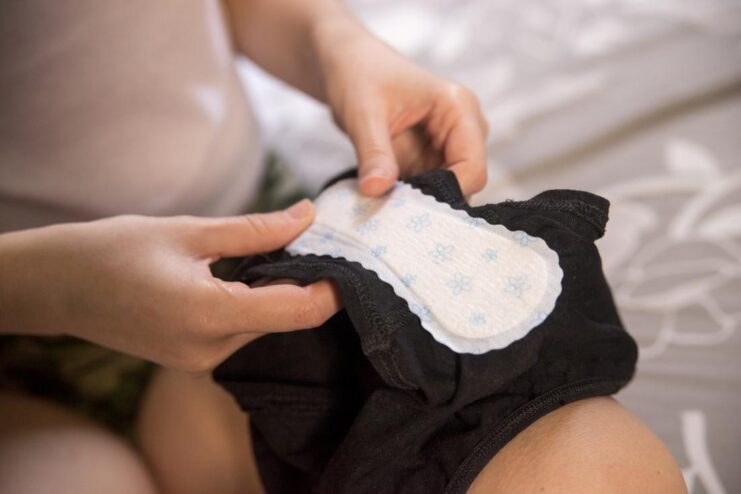
Naturally, during menstruation, the veins of the uterus are congested and are prone to rupture easily. Vaginal walls swell as well during menstruation. This explains the dull pain in the vagina during menses and is 100% normal. Having intercourse during your period can increase the chances of irritation to the swelled-up walls. The advantages of endorphins at this point mask the danger of period sex where irritation of the vaginal walls and introduction to infection are major risks. Any wound or bleeding is a fine gateway to infection.
The cervix is slightly opened during menstruation to let out blood. This heightens the risk of infection, not being limited only to the vagina, but additionally to the uterus. The penetration of the penis into the vagina during menstruation is no more than the introduction to germs at a time when the body is unable to fight them (studies have shown that immunity is decreased during menstruation).
Orgasm results in rhythmic uterine contraction. During menstruation, this helps shed blood faster and shorten your periods. A similar reaction happens when a menstruating woman lifts up heavy loads or does strenuous exercises. This explains why most athletes experience amenorrhoea (missed periods).
The Ugly
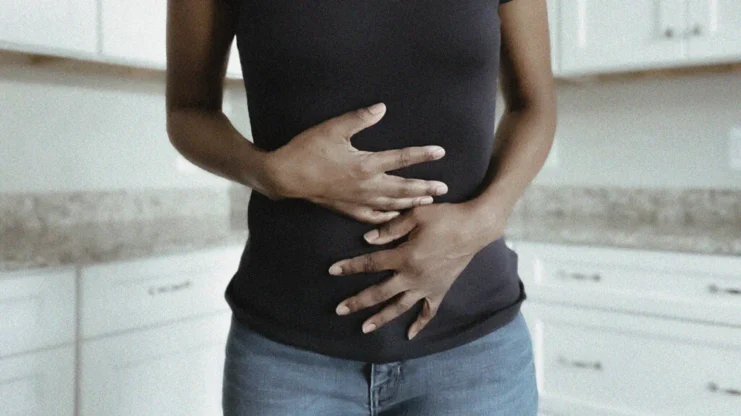
Engaging in sexual activity during menstruation can present certain challenges and considerations that some individuals and couples may find less appealing. While personal preferences and comfort levels vary, it’s important to be aware of the potential downsides. Here are some factors that may be considered as the “ugly” part of having sex during menstruation:
- Messiness: Menstruation involves the shedding of the uterine lining, which can result in blood flow. This can make sexual activity during this time messy and may require additional precautions, such as laying down a towel or using dark-colored sheets. The presence of blood may not be appealing to everyone and can create discomfort or anxiety.
- Hygiene Concerns: Maintaining proper hygiene during sexual activity is essential, particularly during menstruation. Both partners need to be mindful of hygiene practices to prevent the spread of bacteria and potential infections. Extra care should be taken to clean the genital area before and after intercourse.
- Odor: Menstrual blood can have a distinct odor that may be off-putting to some individuals. This can create a sense of self-consciousness or discomfort, especially if there are concerns about the smell being noticeable during sexual activity.
- Potential Discomfort: Some women may experience physical discomfort during menstruation, including bloating, cramps, breast tenderness, or fatigue. Engaging in sexual activity may exacerbate these symptoms or create additional discomfort, which can impact the overall experience.
- Increased Risk of Infection: Although the risk is generally low, engaging in sexual activity during menstruation can slightly increase the risk of infection. The presence of blood can provide a medium for bacteria to thrive. It’s important to practice safe sex by using barrier methods such as condoms to reduce the risk of sexually transmitted infections.
Facts:
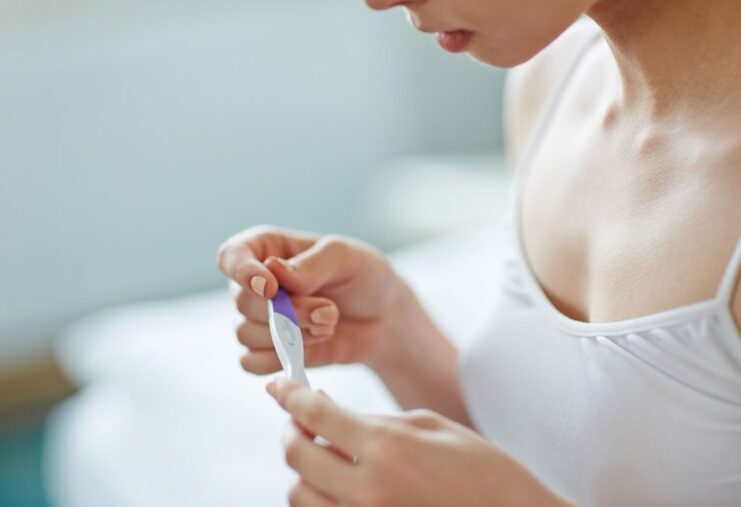
The Surprising Possibility of Pregnancy
Did you know? Conception can still occur during your period. Sperm can survive in the uterus for up to 5 days, and if you have intercourse near the end of your cycle, there’s a chance they’ll be present when you ovulate. Although the risk is lower, it’s important to use protection to prevent unwanted pregnancy.
Protection Against STIs
Safety first! Engaging in sexual activity during menstruation doesn’t eliminate the risk of contracting sexually transmitted infections (STIs). Blood and fluids can transmit STIs, so practicing safe sex is crucial. Consider using barrier protection like condoms or dental dams to safeguard against infections.
Unleashing the Pleasure: Hormone Effects
Prepare for an unexpected pleasure ride! Hormone changes play a significant role in making sex during menstruation enjoyable. As progesterone levels decrease, libido soars, enhancing sexual desire. Week two of your cycle, marked by peak estrogen and testosterone levels, brings a surge in mood, energy, and an irresistible sex drive.
So, is period sex good or bad? Well, momentary pleasure versus risky health – you be the judge.
FAQ
Can sex during menstruation increase the intensity of orgasms?
Yes, the hormonal changes and increased blood flow to the genital area during menstruation can potentially heighten sensitivity and arousal, potentially leading to more intense orgasms for some women. However, individual experiences can vary widely, and not all women will experience this effect.
Can sexual activity alleviate menstrual cramps? How does this work?
During orgasm, the body releases endorphins, which are natural painkillers. Moreover, the uterine contractions that occur during orgasm may help to expel menstrual blood and tissue more quickly, potentially relieving cramps. However, this varies greatly among individuals, and some women may find that sexual activity during menstruation increases their discomfort.
What are the specific risks of getting pregnant if I have sex during my period?
Though the likelihood is generally lower, it is still possible to get pregnant from having sex during your period. This is because sperm can survive in the uterus for up to five days, and if you ovulate soon after your period, there may still be viable sperm present to fertilize an egg. Therefore, it’s recommended to use a form of birth control during intercourse, regardless of where you are in your menstrual cycle.
How does menstruation specifically increase the risk of STIs during sex?
The risk of transmitting or acquiring STIs may be higher during menstruation because the virus or bacteria that cause STIs can be present in menstrual blood. Additionally, the cervix is slightly open during menstruation, which could potentially increase the risk of an infection spreading to the reproductive organs. Therefore, practicing safe sex by using barrier methods such as condoms or dental dams is particularly important during this time.
How can I specifically maintain hygiene during sex on my period?
You should consider cleaning your genital area before and after sexual activity to prevent the spread of bacteria. Laying down a towel or having sex in the shower can help manage the mess. You might also want to consider using a menstrual product designed for sex, such as a menstrual cup or disc, which can reduce the amount of menstrual blood present during intercourse.
How can sex during menstruation specifically impact emotional intimacy between partners?
Engaging in sexual activity during menstruation can potentially foster a deeper sense of emotional intimacy between partners. This act requires open communication, trust, and acceptance of each other’s bodies, which can strengthen the bond and increase feelings of closeness. However, this experience can vary greatly among individuals and couples.
Can sex during menstruation exacerbate physical symptoms like bloating and fatigue?
Some women may experience physical discomforts, such as bloating, cramps, or fatigue, during menstruation, and for some, sexual activity can potentially exacerbate these symptoms. It’s important to listen to your body and communicate with your partner about what feels comfortable. If you experience severe or persistent pain, consult with a healthcare provider.
Final Words
In conclusion, the intersection of sex and menstruation is a complex issue, heavily influenced by individual preferences, cultural beliefs, and personal comfort levels. It’s a realm characterized by a duality of experiences—encompassing potential benefits such as increased sensitivity, pain relief, and deepened emotional intimacy, but also potential downsides, including increased messiness, heightened risk of infection, and potential discomfort.
Related Posts:
- It’s Time to Quit Smoking! Find out How: Kick the Bad Habit
- Is 400 MBPS Good For Gaming? - Explained Everything!
- Vaginal Bleeding During Early Pregnancy: Causes and…
- When to Test for HIV During and After Completion of…
- Foods To Avoid During Pregnancy: Nourishing Your Baby Bum
- Can Ultrasound Be Used During Fertility Assessment?

